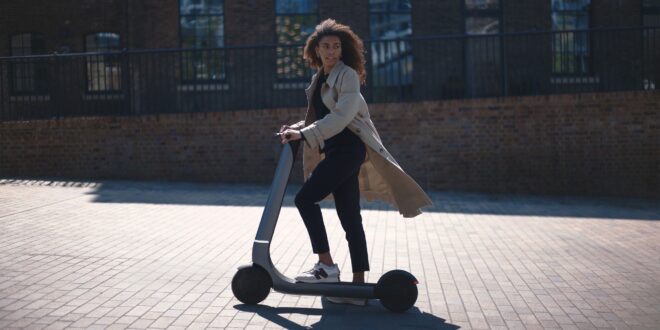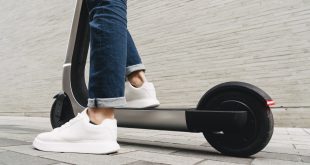Bristol-based mobility startup Bo has just released its first product, a hi-tech e-scooter. Co-founders Oscar Morgan and Harry Wills showed Alex Ballinger their vision for micromobility
This piece first appeared in the October edition of BikeBiz magazine – get your free subscription here

“It’s going to be wild,” said Oscar Morgan, co-founder of e-scooter brand Bo, when I asked about the impact
micromobility will have on urban transport. “I think very few people appreciate it.
“When you reduce the cost of travel by an order of magnitude – it’s actually 10 times cheaper in terms of pure energy to travel on a scooter than any other mode of transport that has a motor – no one quite gets how much this is going to change cities.”
Bo, the brainchild of a group of former Williams F1 engineers, has set out its stall in micromobility with the release of its first e-scooter, the Bo M – a radical, state of the art, and stylish urban transport machine, an alternative to some of the cheaply-made and slightly flimsy models currently available.
Based in an industrial estate in Bristol, Bo is a British company at its heart, but Britain will not be the core market in the early stages for the micromobility startup.
Home and abroad
In the UK, privately-owned electric scooters are still not legal on the roads. The Government has announced the introduction of a new low-emission, low-speed vehicle category in the upcoming Transport Bill, which will pave the way for legalisation, but the legislation is still believed to be months away.
While Bo will not necessarily be held back in business terms, instead targeting European and US markets in its early stages, emotionally, founders Morgan and Harry Wills are invested in the UK embracing e-scooters.

Morgan said: “Commercially, it’s almost not hugely relevant [for us]. From an emotional point of view, do I want to be a British company selling British products in Britain? Yeah, obviously, but in terms of world market, it’s zero difference to us if we’re shipping it to Europe or to the US.
“But I feel really sad because I feel like the improvement could be manifested immediately. Everyone likes to talk good talk about air quality and around congestion, but to actually do something about it and legalise e-scooters is such an easy step.
“It also makes me kind of sad that people who literally can’t afford other modes of transport are being forced to act illegally, because people can’t just get this through, get this done.”
Co-founder Wills added: “Because [private scooters] are illegal it means that a normal person who wants to spend as little as possible commuting to and from their workplace has to be a criminal.
“It seems like a real tragedy that’s harming lots of people, especially when there is a cost of living crisis and people want to be saving as much money as possible. We could have a really nice, cheap, efficient way of getting around the city.”
But it’s not only in transport that people could benefit from the legalisation of e-scooters in the UK, according to Bo, as even the cost of housing could be impacted. If scooters open up cheap transport options to commuters in London, those commuters will no longer have to choose between living close to their workplace or paying more to commute further by train, tube or other public transport.
Instead those workers can live further afield, in cheaper areas, but still have a fast, low-cost, and low-emission way of getting to work.
The tech
What Bo are hoping to offer with their first e-scooter is a complete step change in the way e-scooters are designed. So far, the market has been flooded with low-cost electric scooters, with varying levels of safety standards, reliability, and quality of life features.
But the Bo M has been designed as the peak of e-scooter technology, with a 50km range, Safesteer technology (offering ride stability, even with one hand off the handlebars or when carrying bags), 360-degree lighting, a sleek one-piece chassis, and security features like GPS tracking and alarm settings.
The Bo M, which retails for £1,995, will be shipping to a select audience of early adopters this year, before mass shipping is scheduled to begin next spring.

The launch
While the Bo team are excited to get their product out into the world, they’re also acutely aware of the importance of this first 12 months of shipping, as this is when the reputation of the brand will be built.
On getting the product out into the world, Morgan said: “It’s the only thing we care about. That’s when we start to actually have an impact. The funny thing is that the units over this next year don’t really set the financial future of the company – that’s built over five years of consistently being able to deliver them in a way that is economically sound and so forth.
“But what it does set and what it will impact is the brand of the company like the reputation, and it’s one of the things that I think is remarkable. We have to be able to look after people and for those first units, we’ll send them to places where we know we can look after people. Who gets the first units are the people who we can look after and keeping those numbers low so that we can actually do that. It’s a big part of it.”
Wills added: “The scooter has a profound effect when left to its own devices, people see other people riding, it evokes an emotion in people – that’s a really powerful thing. People say, ‘wow, I didn’t know that that mode of transport could look like that’.
“The network effect of people seeing [the product] in the market, for us to learn more about how people react with it, for investment to be there having products in the market, and also just for people to be seeing it and telling their friends, is the most amazing thing.”
 micromobilitybiz Delivering news updates to the micromobility industry, focusing on e-bikes, e-scooters and green transport
micromobilitybiz Delivering news updates to the micromobility industry, focusing on e-bikes, e-scooters and green transport




